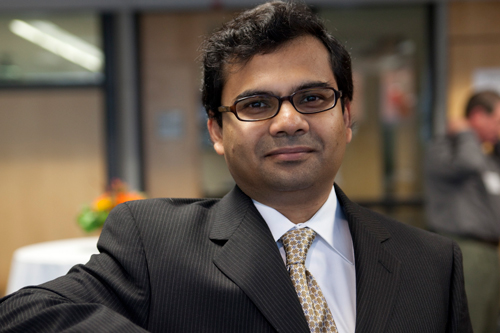![1-Frigon-Dominic[1]](https://reporter.mcgill.ca/wp-content/uploads/2013/10/1-Frigon-Dominic1.jpg)
A joint Ēcole Polytechnique-McGill discussion paper on energy recommends key changes to Québec government thinking on energy policy to encourage more innovative, long-term solutions and lessen the impact of politics on decision-making.
The brief also proposes bold changes in engineering education, greater investment in energy research and mechanisms to involve the public in energy debates.
The recommendations were drafted by engineers at École Polytechnique de Montréal’s Institut de l’énergie Trottier (IET) and McGill’s Trottier Institute for Sustainability in Engineering and Design (TISED). The joint statement, “Towards a self-sufficient Quebec with 100 per cent clean energy,” is the latest in a series of collaborative projects between the two institutes.
The 16-page document is a response to the province-wide energy consultation launched this fall by Québec Natural Resources Minister Martine Ouellet.
“The brief on Québec’s potential for energy self-sufficiency and energy exports is an example of effective collaboration between TISED and IET to advance public policy and student training,” said TISED Director, Subhasis Ghoshal. “The goal is to ensure the sustainability of future energy supplies through clean and renewable energy sources and energy efficiency.”
One of TISED’s and IET’s principal recommendations is that Québec clarify the objectives of its proposed energy policy to emphasize achievable goals rather than approaches. The two institutes say this “reformulation” would help to ensure the policy’s success and “make its implementation less dependent on political decisions by the government in power.”
While the energy strategies outlined recently by Québec’s Commission sur les enjeux énergétiques are encouraging, IET and TISED say they are insufficient to achieve the government’s long-term objectives.
The two institutes propose three additional strategies:
• Give Quebecers tools to make informed energy choices;
• Develop Québec-based expertise to ensure that the province’s energy objectives are met;
• Fund leading-edge multidisciplinary research in clean energy and sustainable development.
The institutes say that Hydro-Québec should play a central role in this research funding, which should support interdisciplinary teams involved in innovative, entrepreneurial science and engineering initiatives backed by experts in the humanities and social sciences.
Decisions based on fact
Building on a philosophy of education already endorsed by the McGill Faculty of Engineering and Ēcole Polytechnique, the two institutes urge the government to encourage all universities and CEGEPs to “decompartmentalize” energy teaching and research as a way to train professionals at the interface of science, engineering, economics, sociology and law.
This convergence will make it possible to develop experts who are highly specialized in one field, but whose overview of adjacent fields will foster dialogue between scientific disciplines and promote acceptance of progressive solutions and more informed decision-making.
IET and TISED estimate that 130,000 energy sector jobs will be created in the near future that require this type of interdisciplinary expertise.

The institutes’ brief says it is essential to link public understanding to political choices, so tools must be created to ensure the public has access to the same factual knowledge about energy that politicians use to set policy.
“At present, beneficial government decisions are too often delayed or even rejected by the public — both in Québec and the rest of the world — because of superficial, incomplete or simply erroneous arguments,” the brief says.
One initiative to address this could be an energy centre with constantly evolving real or virtual exhibits to explain current scientific knowledge about renewable and non-renewable energy sources. IET and TISED say the centre could provide basic knowledge popularized through games and activities, both for adults and younger audiences.
The English translation of the joint IET-TISED brief and the original French-language text are available at TISED-IET Energy Brief
Additional information about the energy consultation and the many briefs submitted are available at Consultation Process
